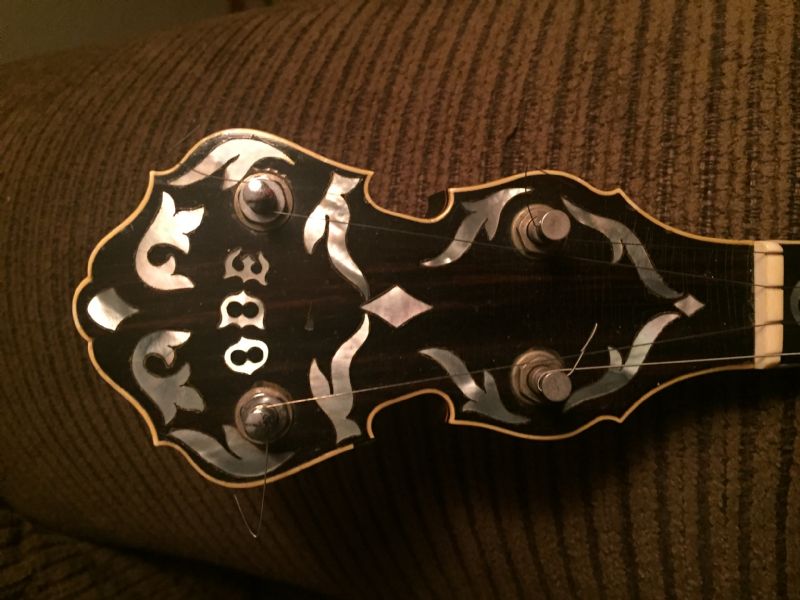In fact, I just saw one downstairs (at the vendors’ stands), an ODE, with no word “Baldwin” on it, but it was made by Baldwin about 1980. So, the sequence of logos was “Baldwin”, then “Baldwin ODE”, then just “ODE”. I should have checked the serial number of that one I just saw. Of 1980.This numbering code started in the early 1970's, after Baldwin moved the Ode banjo works to Arkansas from Colorado. There were several earlier numbering systems used before the buyout and the move. This one made the most sense by far. The first 2 numbers are the month, second 2 are the year, and the third 2 numbers are the individual piece.
In the late summer of 1967, Cam Joyce decided to sell one of his banjos. He had a Gibson banjo he had gotten from Larry Richardson and a Style D Baldwin that he had ordered in September of 1966 and it had been delivered to Melody Haven Music in Roanoke in April of 1967.
The word got around that he would sell either for $600. Marshall Hall had said that he had it and might go ahead and buy the Baldwin. In thinking back, I think Cam probably had pawned it to Marshall for less than the $600.
Dad and I went up to Cam’s house and he said he would trade the Baldwin for my Bacon if I’d give him the $450 difference between them. I had been saving Kennedy half dollars in a microphone tube, so I took them to the old bank downtown in Stuart and turned $450 worth of half dollars in for cash and called Cam and told him I could do the deal.
This was the second Saturday in November when he brought the banjo down to our house and I gave him the Bacon and the cash and became the proud owner of a Baldwin Style D banjo.
Doug Hutchens with Style D Baldwin Serial number 519. Summer 1968. With a hand

During the summer of 1971, while I was working with Bill Monroe, I came home one weekend and Cam heard that I was home. He came down and asked if I ever sold the banjo, would I give him first refusal, to which I agreed. He said that his little boy, named Doug, too, always talked about that pretty banjo and if I ever sold it, he would like to buy it back.
The next summer Cam got killed in a truck wreck.
Years later, I was talking to Clarence Hall one night and he mentioned that Doug Joyce had asked about the banjo that I had bought from his Dad. He asked if I would be interested in selling it to him.
I had to think about this a little, but I decided that if Doug wanted it, I would sell it back to him for what his dad had wanted for it, $600. But if he ever sold it, I was to get first refusal at the same price. After a few years Doug Joyce called one day and said “I don’t guess you’d want this Baldwin banjo back, would you?” I said if you are going to sell it, I will buy it. The value had appreciated, but he sold it back to me at the same price. I still have it today, having hopefully done what Cam would have appreciated in letting his son have it until he was ready to move on.
Baldwin Ode Banjo Serial Numbers
After the difficult 1977 luthier strike at C. F. Martin Co., the corporate enthusiasm for manufacturing banjos sharply declined. Parts were soon shipped from Nazareth, PA, to Canada or Japan for assembly, and record keeping of serial numbers slid into disarray. Despite this unfavorable marketing climate, the Martin Company launched a top of the line Tu-Ba-Phone Deluxe resonator banjo series in 1978 based on the unique tone ring designed by Vega in 1909.
Baldwin Ode Banjo Serial Numbers

A few standard open back and long neck Tu-Ba-Phone 5-stringers were manufactured in 1976 with properly recorded serial numbers, but the logbook soon ended with #1945. The very last banjo built at the Nazareth factory was #1969 as documented with a Letter of Authenticity by Martin historian Mike Longworth. But, what about the missing 23 other banjos bearing #1946 through #1968? The BRC has received information on only one Tu-Ba-Phone Deluxe, but its serial number was a duplicate and spurious. Inside its resonator, however, it bore the C.F. Martin logo- a very distinctive and unique marking (click to enlarge).If any reader has information on a Tu-Ba-Phone Deluxe 5-stringer or any C.F. Martin banjo bearing a serial number between #1946-1968, let us know via our Vega Martin Banjo Info mailbox. We would be delighted to hear from you.

P.S. After Martin sold the Vega line overseas in 1979, Deering purchased the Vega brand name rights in 1989 and now offers an open back Vega #2 Banjo featuring the classic tubaphone tone ring.